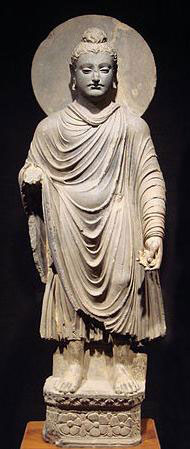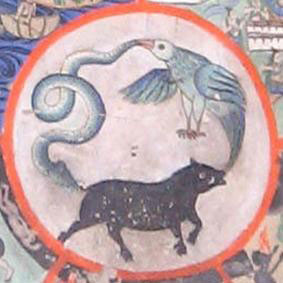Buddhism

Buddhism, in general, is called a dharma which
translates to doctrine or method. It is a religion or philosophy largely based on the teachings of Buddha or
Gautama Siddhartha, the son of a Raja who lived near present Nepal (~600 BC). Buddha means ‘the awaken one’
which originates from the Sanskrit ‘Budh’ – the man who woke up.
Buddhism does not worship a God and Buddhist do
not worship the Buddha. Buddhists believe discovering deep truths on how the world works. Their goal is to help
sentient beings end ignorance (avidyā), to break free from the harmful nature of desire, to escape from what is
seen as a cycle of suffering and rebirth and to achieve a state of enlightenment or Nirvana. The view that
the Buddhist do not follow divine commands, but for trying to end the suffering of all conscious beings is similar
with utilitarianism.
In “Cutting Through Spiritual
Materialism” Buddhist author Chogyam Trungpa observes: “The
Buddha was not a religious fanatic, attempting to act in accordance with some high ideal. He just dealt
with people simply, openly and very wisely. His wisdom came from transcendental common sense. His
teaching was sound and open…It is a question of what is sane to you, the really solid, sound, stable approach to
life”.
Comparative religion scholar,
Dr. Alan
Watts, has referred to Buddha as “the first great
psychologist”.
There are two major branches of
Buddhism:
1) Theravada - "The School of the Elders" (following in Sri Lanka,
Southeast Asia)
2) Mahayana - "The Great Vehicle" (following in
East Asia)
The Mahayana school includes several
traditions: Zen, Pure Land, Nichiren
Buddhism, Tibetan Buddhism, Shingon, Tiantai (Tendai),
Shinnyo-en.
The foundations of Buddhist tradition and
practice are the Three Jewels:
1. Buddha
2. Dharma (the teachings)
3. Sangha (the community)
Taking "refuge in the triple gem" has
traditionally been a declaration and commitment to being on the Buddhist path and in general distinguishes a
Buddhist from a non-Buddhist.
The Buddhist doctrine is called the ‘Middle
Way’ – neither ascetic or
hedonistic – and is summed up in the "four noble
truths". The first truth is about suffering, the second truth is about the cause of suffering, the third
truth is about the ceasing of suffering and the fourth truth is about the way to the ceasing of
suffering.
Four Nobel
Truths
1. Dukha – Suffering. Chronic
frustration, agonized bondage to the endless cycles of rebirths.
2. Trishna – Cause of suffering. Ignorance about the ‘true’ nature of existence
can result in a clutching or desiring of material or sensual pleasures which creates suffering (eg, money is your
God). Avidyā = ‘non-vision’; not seeing (ignorance).
3. Nirvana - Elimination of ignorance and desire. Final salvation. To live in a
‘let go’ way. Avoid living one’s life as a sense of duty. Nirvana translates to ‘blow out’. Our
word ‘spirit’ has its roots in breath. Life is breath. If you hold your breath you lose it. Trisna in
action: you breathe in air and if you ‘cling’ to it you lose it. Just like things in life (things, money,
love). Nirvana means breath out. Whew! The sigh of relief. If you relax you’re in nirvana
and you become a Buddha (best to be subtle about it or others will most likely use you as an object of trisna – of
clinging).
4. The Eightfold path – Method of realizing Nirvana. All the paths begin
with ‘right’.

Every Buddhist from the Therevada school
recites a ‘formula’: The Three Refugees and The Five Precepts. They are moral laws somewhat like the ten
commandments. The difference is that one takes them upon themselves voluntarily, not by obedience to a royal
edict.
The Three Refugees:
1. I take refuge in Buddha.
2. I take refuge in the Dharma – the method.
3. I take refuge in the Sangha – the fraternity of the followers of the
Buddha.
The Five Precepts:
1. I promise to abstain from taking life.
2. I promise to abstain from taking what is not given.
3. I promise to abstain from exploiting my passions.
4. I promise to abstain from false speech.
5. I promise to abstain from getting intoxicated.
The Three Poisons

Avidyā (‘ignorance’) is one of the ‘three
poisons’ which are represented in the hub of the ‘Wheel of Life’ as a pig, a bird, and a
snake.
1. Ignorance (pig)
2. Attachment (bird)
3. Aversion (snake)
Ignorance is the root poison, from which
attachment and aversion arise. The three poisons have been compared to the western psychological concepts
of:
1. Narcissism (bogus
Pride)
2. Desire
(Lust)
3. Anger
American psychiatrist Mark Epstein
states:
“The first wave of psychoanalysis, the classical period of Freud and his
followers that extended into the 1950s, was primarily concerned with uncovering repressed desire and anger, or Eros
and Thanatos, the life and death instincts, which in some way correspond to the Buddhist (concepts of attachment
and aversion). The next wave, of object relations and narcissism that has dominated the past thirty years, exposed
the gap within: the emptiness, inauthenticity, or alienation that results from estrangement from our true selves
and our confusion or ignorance about our own true natures. In the Buddhist view, this is the black hog of delusion
(i.e. ignorance), the root or precondition of greed and hatred”.
The difficulty for Western people is that Buddhism suggests
fatalism. It suggests that the individual is nothing more a puppet of cosmic forces. The Buddhist does
not feel this for his inner sense of identity is at one with himself and the entire cosmos. Unlike the
Buddhist, the Gnostic Christian, with his knowledge of ‘Themes’, knows that he has had a ‘cosmic’ hand in the whole
affair (ie, you wrote your 'script') – all with to sole purpose to perfect the soul.
z
| 

